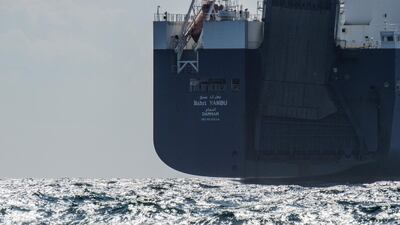National Shipping Company of Saudi Arabia, or Bahri – a shipping and logistics company part-owned by the kingdom’s Public Investment Fund – signed an agreement with the Saudi Agricultural and Livestock Investment Company (Salic) to set up a grains terminal in the country as it looks to expand its logistics operations.
Under the deal, Bahri and Salic – also a subsidiary of PIF – have set up a joint venture entity, National Grain Company to build and handle the $110 million (Dh403.7) terminal at Saudi Arabia's Yanbu Commercial Port, Bahri said in a bourse filing to the Tadawul exchange, where its shares trade.
A contractor will be appointed during the second half of this year and the terminal is expected to be operational by the second quarter of 2021. Covering an area of 313,000 square metres, the terminal will have a storage capacity of 280,000 tonnes, and will be initially be able to handle 3 million tonnes of grains and cereals a year, with capacity eventually increasing to 5 million tonnes.
The planned project will be funded through a combination of the company's cash flow and bank financing, according to the statement. It will oversee the trade, handling and storage of grain from the Black Sea, South America and the Red Sea region, and will help with "the provision of basic food products and price stability in the kingdom", according to Saudi Arabia's Minister of Environment, Water and Agriculture, Abdulrahman Al-Fadhli, who is also chairman of Salic.
"We are confident that this company will play a major role in strengthening supply chains in the Kingdom of Saudi Arabia, as it will lead to the building of the largest regional centre for grains," Mr Al Fadhli said.
Bahri, in which state oil firm Saudi Aramco has a 20 per cent stake, operates one of the largest fleets of crude oil vessels in the region.
Last week, its subsidiary National Chemical Carriers signed a $410m order with the Hyundai MIPO Dockyard for 10 chemical tankers, which will be delivered in phases, starting from the first quarter of 2022 until the first quarter of 2023, it said in a statement at the time.
In July, Bahri reported an almost 17 times rise in its quarterly profit. Profit for the three months ending June 30 climbed to 760.61m riyals (Dh744.9m), from 45.57m riyals in the same period in 2019.
The company attributed the rise in profitability to the recovery of global oil markets and the rise of transportation rates as demand for tankers jumped during the reporting period.


